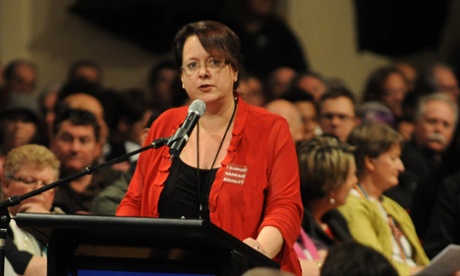The bill, making it a crime to kill a foetus without the mother’s consent, lapses after failing to pass upper house

Zoe’s law, a bill that critics argued puts a woman’s right to abortion at risk by giving personhood to a foetus, has failed in the New South Wales parliament after being left to languish in the upper house.
The bill lapsed at 3.30pm on Thursday without being brought forward by the government or anyone else after passing the lower house last year.
The bill was introduced after a campaign by Brodie Donegan, whose daughter was stillborn at 32 weeks after Donegan was hit by a drugged driver on Christmas Day in 2009. The driver was not charged for Zoe’s death. The baby had been listed as one of Donegan’s injuries.
The bill would make it a crime to cause the death of a foetus without the mother’s consent while in the act of committing a crime. The Australian Medical Association (AMA) and New South Wales Bar Association criticised the bill for giving personhood to a foetus older than 20 weeks or heavier than 400gm.
Labor member of the legislative council Penny Sharpe said the government had let the bill die as slowly as possible on the notice paper before the election.
“I think the bill was well-intentioned but I think from the campaign run against it and the expert advice we received from a number of groups, people recognised it was the wrong way to go, it’s a victory for common sense and good discussions that happen across the parliament,” she said.
Donegan, who is pro-abortion, was prepared for the bill to fail and last week said she would look to work with women’s groups to prepare another version of it next year after the election.
Sharpe, who opposed Zoe’s law, said many women’s groups had been sympathetic to the issues Donegan had raised and Sharpe said she would consider any bill that came before her.
“I think the reality in New South Wales is that there are very fragile legal frameworks in relation to women’s ability to access abortion and I believe foetal personhood would chip away at that and I’m not prepared to see that,” she said.
The chair of the Women’s Electoral Lobby, Melanie Fernandez, said the group was happy members of the upper house had listened to the group and experts from the legal community and health sector.
“It would have pretty far-reaching risks, particularly for access to abortion, particularly for access to late-term abortions which are usually done for medical reasons. It would have impacted on women’s ability to control their bodies during pregnancy,” she said.
Fernandez said giving personhood to a foetus in America had resulted in behaviour of pregnant women being criminalised and though she was open to discussions with Donegan she was not confident in the creation of another bill.
“We’re obviously a women’s advocacy group we always want to progress rights of all women and that’s all about having protection for pregnant women and making sure the law has serious consequences for women who lose a foetus as the result of a criminal act. We definitely support having legal provisions in place and what legal groups have said is the current law is sufficient,” she said.
“We’re open to conversations about it but the concern for us is we would never be able to agree to legislation which introduces foetal personhood and that is at the heart of this issue and the heart of this bill.”
Fernandez said the bill lapsing was a “big relief” for the organisation. “This is an ongoing campaign, there are still concerns about a bill introducing foetal personhood being introduced down the road … abortion remains in crime act and we would like to see that addressed,” she said.
Donegan has previously criticised the campaign against the bill saying people became too focused on the role of two conservative men in it, Fred Nile and Chris Spence, even though the bill was her initiative.
“I find it really frustrating, as much as I think the current version won’t pass the upper house, I’m glad we are having this conversation,” she told Guardian Australia.
“[Women’s advocacy groups] need to acknowledge current laws are not adequate and that they are willing to work with Jacqui [Sparks] on something that’s going to make the bar association and the AMA happy. That’s what I want.”
